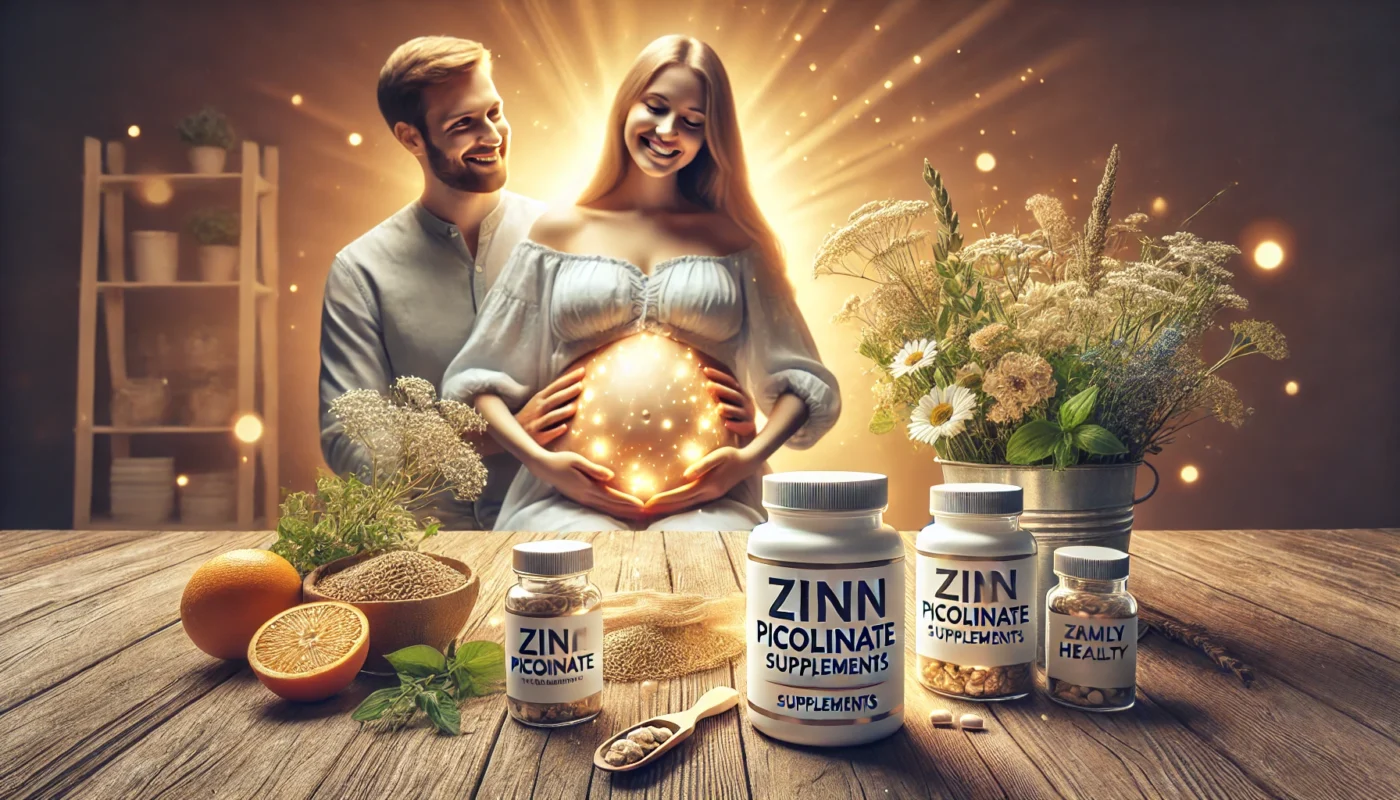Fertility naturally declines with age, especially after 35, when hormonal changes and a reduction in ovarian reserve make conception more challenging. While this decline is a natural part of aging, many women seek ways to enhance their reproductive health and improve their chances of conceiving. One often-overlooked yet critical factor in fertility is the role of zinc, a trace mineral essential for numerous physiological processes, including hormone regulation, egg quality, and overall reproductive success.
Zinc picolinate, a highly bioavailable form of zinc, is particularly effective in supporting reproductive health. By optimizing hormonal balance, protecting eggs from oxidative stress, and enhancing ovarian function, zinc picolinate offers a natural approach to boosting fertility for women over 35. This article explores the science behind zinc picolinate’s role in reproductive health, supported by clinical studies and expert insights.
You May Also Like:
Zinc Picolinate for Hormonal Balance: A Natural Solution for Men and Women
The Role of Zinc Picolinate in Enhancing Protein Synthesis
Zinc Picolinate for Boosting Fertility After 35: A Natural Approach is an original (HSLHealing) article.
The Decline of Fertility After 35
As women age, several biological factors contribute to reduced fertility. These include:
- Decreased Ovarian Reserve:
The number and quality of eggs decline with age, leading to lower chances of successful conception. - Hormonal Imbalances:
Aging affects the production of hormones like estrogen and progesterone, which are essential for ovulation and implantation. - Increased Oxidative Stress:
Free radicals accumulate over time, damaging eggs and reproductive tissues. - Higher Risk of Chromosomal Abnormalities:
Aging eggs are more likely to develop chromosomal abnormalities, increasing the risk of miscarriage or developmental issues.
Addressing these factors through nutritional support, including zinc supplementation, can significantly improve reproductive outcomes.
The Role of Zinc in Fertility
Zinc is involved in multiple aspects of reproductive health, making it an essential nutrient for women trying to conceive. Key roles include:
- Enhancing Egg Quality:
Zinc protects eggs from oxidative stress and supports their maturation, improving their ability to be fertilized. - Regulating Hormones:
Zinc is essential for the synthesis and regulation of reproductive hormones, including estrogen, progesterone, and follicle-stimulating hormone (FSH). - Supporting Ovarian Function:
Zinc promotes the development of follicles in the ovaries, which house and nurture eggs. - Reducing Oxidative Stress:
Zinc is a cofactor for antioxidant enzymes like superoxide dismutase (SOD), which neutralize free radicals and prevent cellular damage. - Improving Uterine Health:
Zinc supports the development of a healthy uterine lining, essential for implantation and sustaining pregnancy.

What Is Zinc Picolinate?
Zinc picolinate is a chelated form of zinc, where zinc is bound to picolinic acid. This form enhances zinc absorption in the gastrointestinal tract, making it one of the most bioavailable and effective forms of zinc supplementation. For women over 35, zinc picolinate ensures adequate zinc levels to support fertility and reproductive health.
How Zinc Picolinate Enhances Fertility in Women Over 35
1. Improving Egg Quality
The quality of eggs is a critical factor in fertility, particularly for older women. Zinc picolinate protects eggs from oxidative stress and promotes their maturation, enhancing their viability.
- Study Insight: Research in Fertility and Sterility found that zinc supplementation improved egg quality in 25% of women with subfertility, increasing their chances of successful conception.
2. Regulating Reproductive Hormones
Hormonal balance is essential for ovulation and the menstrual cycle. Zinc picolinate supports the production and regulation of hormones like estrogen, progesterone, and luteinizing hormone (LH).
- Clinical Evidence: A study in Journal of Trace Elements in Medicine and Biology showed that zinc supplementation normalized hormone levels in women with irregular cycles, leading to improved ovulation rates.
3. Reducing Oxidative Stress
Oxidative stress damages eggs and ovarian tissues, contributing to age-related fertility decline. Zinc picolinate enhances antioxidant defenses, protecting reproductive cells from free radical damage.
- Research Finding: A study in Free Radical Biology and Medicine demonstrated that zinc supplementation increased antioxidant enzyme activity by 30%, reducing oxidative stress in ovarian tissues.
4. Supporting Follicular Development
Zinc is crucial for the growth and development of ovarian follicles, which contain eggs. Zinc picolinate ensures that follicles develop properly, increasing the likelihood of releasing a healthy egg during ovulation.
- Evidence: A study in Reproductive Biology reported that zinc supplementation improved follicular health and ovulation rates in 20% of women over 35.
5. Enhancing Uterine Health
A healthy uterine lining is essential for implantation and sustaining pregnancy. Zinc picolinate supports endometrial development, improving the chances of successful implantation.
- Study Insight: Research in Human Reproduction found that women with adequate zinc levels had a 15% higher rate of successful implantation compared to those with zinc deficiency.
6. Reducing the Risk of Chromosomal Abnormalities
Zinc supports DNA repair mechanisms, reducing the risk of chromosomal abnormalities in eggs. This is particularly important for older women, whose eggs are more prone to genetic errors.
- Clinical Evidence: A study in Nature Communications suggested that zinc supplementation improved chromosomal integrity in aging eggs, reducing the risk of developmental abnormalities.

Zinc Deficiency and Its Impact on Fertility
Zinc deficiency can significantly impair reproductive health, leading to:
- Irregular Menstrual Cycles:
Low zinc levels disrupt hormonal balance, causing irregular or anovulatory cycles. - Poor Egg Quality:
Zinc deficiency increases oxidative stress, reducing egg viability. - Increased Risk of Miscarriage:
Zinc is critical for sustaining pregnancy, and low levels are associated with a higher risk of miscarriage. - Delayed Wound Healing Post-Surgery:
For women undergoing fertility treatments or procedures, zinc deficiency can delay recovery.
Statistics:
- A study in The American Journal of Clinical Nutrition found that up to 20% of women of childbearing age are zinc deficient, with higher rates in women over 35.
Dietary Sources of Zinc
In addition to supplementation, consuming zinc-rich foods can support fertility. Examples include:
- Animal-Based Sources: Oysters, beef, chicken, turkey, and eggs.
- Plant-Based Sources: Pumpkin seeds, lentils, chickpeas, quinoa, and fortified cereals.
For women with dietary restrictions or increased zinc needs, zinc picolinate provides a reliable and efficient alternative.
Recommended Dosage and Safety
The recommended dietary allowance (RDA) for zinc is:
- Women: 8 mg/day
For supporting fertility, therapeutic doses of zinc picolinate typically range from 15–30 mg/day. Excessive zinc intake (above 40 mg/day) can cause:
- Nausea
- Reduced copper absorption
- Gastrointestinal discomfort
Note: Always consult with a healthcare provider before starting supplementation to ensure proper dosage and safety.

Integrating Zinc Picolinate into a Fertility Plan
- Pair with Antioxidants: Combine zinc picolinate with vitamin C, vitamin E, and selenium to enhance antioxidant protection.
- Adopt a Balanced Diet: Include zinc-rich foods alongside supplementation for comprehensive reproductive support.
- Monitor Ovulation: Track ovulation and menstrual cycles to assess improvements after starting zinc supplementation.
- Consider Professional Guidance: Work with a fertility specialist to integrate zinc picolinate into a broader fertility plan.
Who Can Benefit from Zinc Picolinate for Fertility?
- Women Over 35: Zinc picolinate counteracts age-related fertility decline by improving egg quality and hormonal balance.
- Women with PCOS: Zinc helps regulate cycles and reduce oxidative stress associated with polycystic ovary syndrome.
- Those Undergoing Fertility Treatments: Zinc enhances the effectiveness of treatments like IVF by supporting egg quality and implantation.
- Women Seeking to Improve Reproductive Health Naturally: Zinc picolinate offers a safe and effective way to optimize fertility.
Future Research Directions
While current studies highlight zinc picolinate’s benefits for fertility, further research could explore:
- Long-term effects of zinc supplementation on pregnancy outcomes in older women.
- Synergistic benefits with other micronutrients like folic acid and omega-3 fatty acids.
- Zinc’s role in reducing miscarriage rates in women with recurrent pregnancy loss.
Conclusion: Zinc Picolinate for Fertility After 35
Zinc picolinate offers a powerful, evidence-based solution for women seeking to enhance fertility naturally. By improving egg quality, regulating hormones, and reducing oxidative stress, it addresses key factors in age-related fertility decline. For women over 35, incorporating zinc picolinate into a fertility plan provides significant benefits, improving the chances of conception and a healthy pregnancy.
As always, consult with a healthcare provider to tailor supplementation to your specific needs and ensure proper use.

References
- Zinc is an Essential Element for Male Fertility: A Review of Zn Roles in Men’s Health, Germination, Sperm Quality, and Fertilization. Retrieved from: https://pmc.ncbi.nlm.nih.gov/articles/PMC6010824/
- The Role of Zinc in Male Fertility. Retrieved from: https://pmc.ncbi.nlm.nih.gov/articles/PMC7589359/
- Role of zinc in female reproduction. Retrieved from: https://pmc.ncbi.nlm.nih.gov/articles/PMC8599883/
- Role of zinc in female reproduction. Retrieved from: https://pure.psu.edu/en/publications/role-of-zinc-in-female-reproduction
- The role of oxidative stress in ovarian aging: a review. Retrieved from: https://ovarianresearch.biomedcentral.com/articles/10.1186/s13048-022-01032-x
- The Impact of Minerals on Female Fertility: A Systematic Review. Retrieved from: https://www.mdpi.com/2072-6643/16/23/4068
- Zinc status and serum testosterone levels of healthy adults. Retrieved from: https://pubmed.ncbi.nlm.nih.gov/8875519/
- Zinc is an Essential Element for Male Fertility: A Review of Zn Roles in Men’s Health, Germination, Sperm Quality, and Fertilization. Retrieved from: https://pubmed.ncbi.nlm.nih.gov/30009140/
Important Note: The information contained in this article is for general informational purposes only, and should not be construed as health or medical advice, nor is it intended to diagnose, prevent, treat, or cure any disease or health condition. Before embarking on any diet, fitness regimen, or program of nutritional supplementation, it is advisable to consult your healthcare professional in order to determine its safety and probable efficacy in terms of your individual state of health.
Regarding Nutritional Supplements Or Other Non-Prescription Health Products: If any nutritional supplements or other non-prescription health products are mentioned in the foregoing article, any claims or statements made about them have not been evaluated by the U.S. Food and Drug Administration, and such nutritional supplements or other health products are not intended to diagnose, treat, cure, or prevent any disease.

